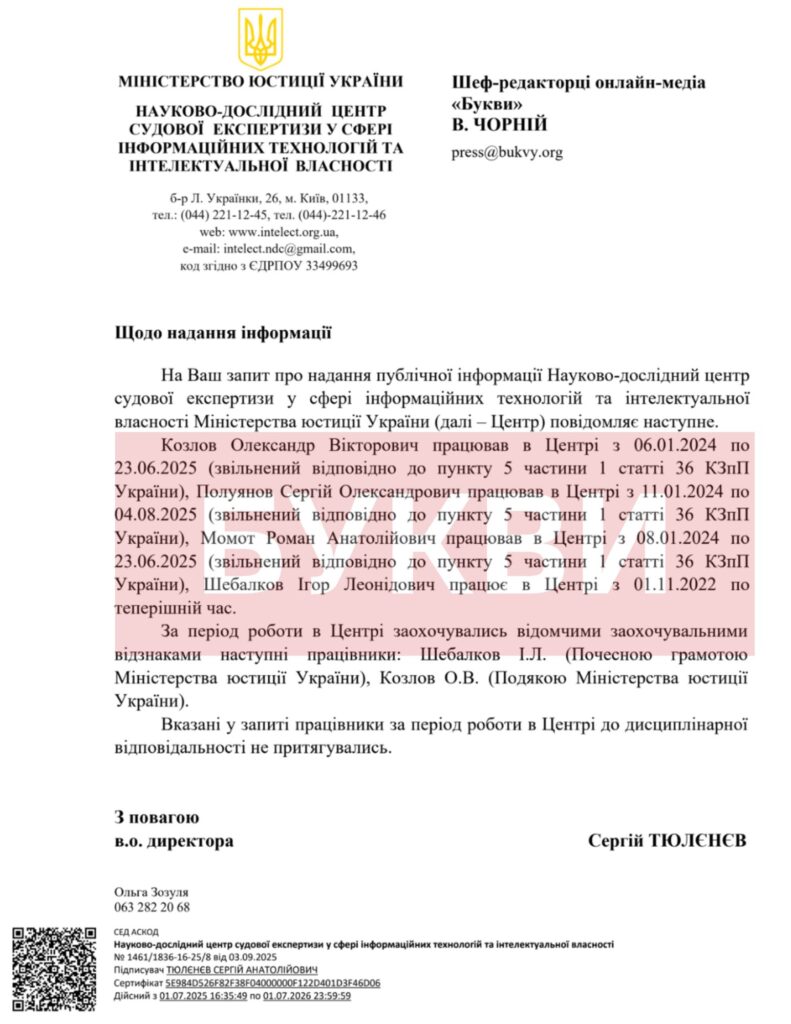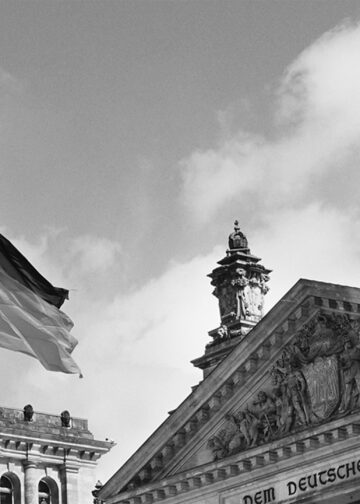The Research Center for Forensic Expertise in Information Technologies and Intellectual Property of the Ministry of Justice of Ukraine provided a response regarding the status of the experts who worked on the expertise within the investigation against Ukraine’s fifth president, Petro Poroshenko, in the case concerning the Kharkiv agreements and the constitutional enshrinement of the intention to join the EU and NATO.
Source: PRYAMYI
The Center’s response confirms that three out of four experts who participated in preparing the expertise resigned from the Center shortly after completing work on this case, raising further questions about the validity of the charges against the opposition leader.

According to the provided information, Oleksandr Kozlov, Serhiy Poluyanov, and Roman Momot, who had worked at the Center since January 2024, were dismissed in the summer of 2025. Kozlov and Momot ended their cooperation on June 23, 2025, and Poluyanov on August 4, 2025. All three were dismissed under item 5, part 1, article 36 of the Labor Code of Ukraine, which provides for termination of the employment contract by mutual agreement. The fourth expert, Ihor Shebalkov, who has been working at the Center since November 1, 2022, remains in his position.
Interestingly, the dismissal of the three experts occurred shortly after the completion of the expertise, which was key in the case against Poroshenko regarding the Kharkiv agreements.
In March this year, “Bukvy” received, from their own sources in the Verkhovna Rada, a request from the State Bureau of Investigation (DBR) to the Apparatus of the Verkhovna Rada. In this request, the Deputy Head of the DBR, Artem Yablonsky, demanded “to provide certified copies … of the Law of Ukraine ‘On Amendments to the Constitution of Ukraine (regarding the strategic course of the state towards full membership of Ukraine in the European Union and the North Atlantic Treaty Organization)’ dated 07.02.2019 №2680-VIII, as well as case materials on the submission and consideration of the draft of this Law of Ukraine.”
Representatives of Petro Poroshenko link the DBR’s activity to an attempt to accuse him of facilitating the Kharkiv agreements, signed on April 21, 2010, immediately after Viktor Yanukovych came to power. One month before the signing of the agreements, Poroshenko had been dismissed from his post as Minister of Foreign Affairs. According to Illya Novikov, the lawyer of the fifth president, due to this inconsistency, the investigation decided to add the episode regarding the 2019 constitutional enshrinement of Ukraine’s course toward EU and NATO membership, allegedly to demonstrate that these constitutional changes caused the full-scale Russian invasion, and thus constituted treason. To support its position, the DBR requested an expertise on the compliance of Poroshenko’s actions and decisions with the Constitution, laws, and several subordinate normative legal acts.
As noted by the NGO “Center for the Study of Ukrainian Legislation,” articles 101 and 242 of the Criminal Procedure Code of Ukraine, as well as article 14 of the Law “On Forensic Expertise,” explicitly prohibit an expert from deciding legal issues – this is the exclusive competence of the court (and regarding constitutionality, exclusively the Constitutional Court). Moreover, the experts’ specialization (in military research, electrical devices, explosive devices, ballistics, and fire safety) does not correspond to the content of the questions posed to them by the investigation.
Western partners of Ukraine, including the US Embassy, have repeatedly warned the authorities against political persecution of the opposition (specifically Petro Poroshenko), emphasizing that such actions could undermine the country’s unity and democratic image, especially during wartime.
In March this year, “Bukvy” received from their parliamentary sources a DBR request to the Verkhovna Rada Apparatus. The investigator in the criminal proceeding – Deputy Head of the DBR, Artem Yablonsky – asked “to provide, as soon as possible, certified copies … of the Law of Ukraine ‘On Amendments to the Constitution of Ukraine (regarding the strategic course of the state towards full membership of Ukraine in the European Union and the North Atlantic Treaty Organization)’ dated 07.02.2019 №2680-VIII, as well as case materials on the submission and consideration of the draft of this Law of Ukraine.”
Criminal proceeding №62023000000000007 was opened on January 6, 2023, to accuse Poroshenko regarding the Kharkiv agreements signed on April 21, 2010. However, Poroshenko did not hold any government position or serve as a member of parliament at the time of the Kharkiv agreements. Therefore, the case added the episode about the 2019 constitutional enshrinement of Ukraine’s course toward EU and NATO membership. The DBR intends to prove that these constitutional changes caused the full-scale Russian invasion, and therefore constituted treason. On February 19, 2025, the investigator appointed an expertise. Its conclusions state, among other things, that the legislative rejection of non-alignment and the constitutional inclusion of Ukraine’s aspiration to join NATO did not contribute to “increasing Ukraine’s defense capabilities; the possibility of full membership in NATO; timely measures to effectively repel the Russian armed aggression against Ukraine; preventing the spread of Russian aggression to other territories of Ukraine; or preventing the full-scale invasion of the Russian Federation into Ukraine in 2022 and the subsequent advance of Russian armed forces into Ukrainian territory in 2022-2025.” The experts assessed Poroshenko’s actions as causing harm to Ukraine’s defense capabilities and sovereignty.
As absurd as it may seem, according to Poroshenko’s lawyer Illya Novikov, the expertise, signed by three experts who have already resigned, does not aim to establish the truth. Its goal is to provide the “right” judge with grounds for the desired decision. Novikov notes that this method has long been used in the Russian judicial system. He also suggests that the idea to prosecute Poroshenko was proposed to the Presidential Office by former Deputy Head of Yanukovych’s Administration, Andriy Portnov. Portnov had been involved in preparing the Kharkiv agreements and, after 2019, initiated a series of absurd criminal cases against Poroshenko.
The conclusion of the expertise in this case, as well as its overall narrative, ideologically aligns with the Kremlin’s narrative that Ukraine’s Euro-Atlantic integration posed a potential threat to Russia, giving the aggressor state justification for a full-scale invasion.
Previously, Russian diplomats used materials from the “sailors’ case” (regarding the order for Ukrainian ships to pass through the Kerch Strait) at the UN Security Council as arguments against Ukraine. The case against Poroshenko was initiated precisely on Portnov’s complaint.











Discussion about this post